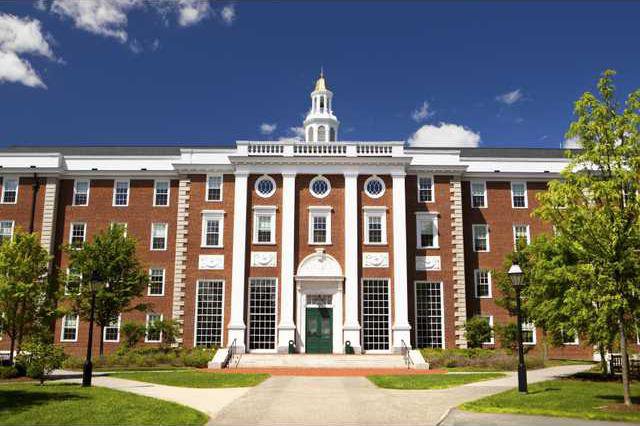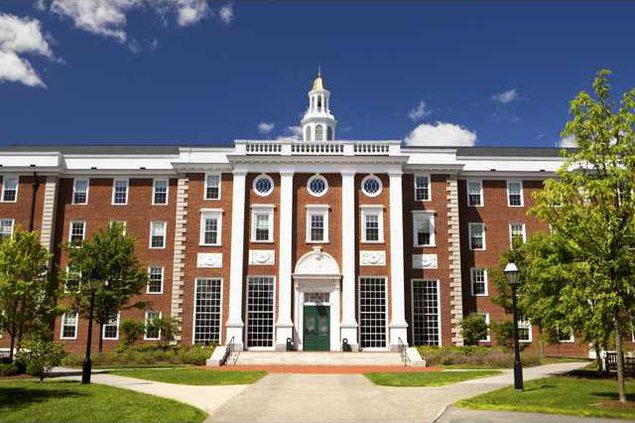Getting into an Ivy League college can be the chance of a lifetime. But for some low-income students, it comes with a price of loneliness and isolation.
Graduates from Ivy League schools make more money and get hired at higher rates, according to a study from the National Bureau for Economic Research, and for a long time Ivies were almost exclusively home to kids from elite families. But over the last several years, Ivies have opened their doors with generous "zero family contribution" scholarships that essentially provide funding to any student that gets in.
Princeton was the first to make this offer in 1998, followed by Harvard in 2004 and Yale in 2005. Families with income less than $65,000 are not expected to contribute to their students' college costs, and those under $150,000 get significant grants and financial aid.
It's a once-in-a-lifetime opportunity for a student like Ana Barros, whose parents moved to Newark, New Jersey, from Colombia before she was born. She got an email saying that she had been accepted at Harvard with a full scholarship. "I knew at that moment that Id never suffer in the way that my parents did," Barros, now a junior at Harvard, told the Boston Globe.
But when she began her freshman year, she "felt so out of place she might as well have had the words 'low income' written on her forehead." Low-income students are still relatively small in number on these top-tier campuses, and unlike many of their peers, they hold down jobs, have little spending money for clothes or going out, much less spring break trips. Some even send money home.
Now, Barros is president of Harvard's First Generation Student Union, a group for advocacy and support of students like her who are the first in her family to attend a four-year college. Similar organizations have cropped up at other Ivies to help students "transition" into a college where few of their peers share their same life experience and challenges.
First Generation campus groups are helping administrations see issues that might not at first seem obvious dining halls close during holiday breaks, for example, when some kids can't afford to go home. Student fees, the cost of books and co-pays for student health centers are nominal for some students, but for low-income students, it can break the bank.
Anthony Jack is a Ph.D. candidate at Harvard researching the experience of lower-income undergrads at elite colleges, and he counsels these students on campus as well. His dissertation looks at what he calls the "privileged poor," lower-income students who arrive on campus having graduated from private schools and prep schools, and those who come from public high schools. He calls this second group of students "doubly disadvantaged," because they live ever more divergent lives from their families and the communities they grew up in.
The second group, he says, feels less entitled and is less likely to ask a professor for help with a paper or develop a relationship with a faculty member to get a recommendation for an internship or fellowship, because they are used to doing everything on their own. Jack told the Boston Globe that he has to tell students that he mentors: Youre worth a professors time."
As support and funding grows stronger at top schools, it pays off in spades in terms of success for disadvantaged kids. The graduation rate for low-income students around the country is 11 percent. But at Harvard and Yale, where the financial burden is removed, 98 percent of those students graduate with a four-year degree, according to data from I'm First, an online community for first-generation students.
Graduates from Ivy League schools make more money and get hired at higher rates, according to a study from the National Bureau for Economic Research, and for a long time Ivies were almost exclusively home to kids from elite families. But over the last several years, Ivies have opened their doors with generous "zero family contribution" scholarships that essentially provide funding to any student that gets in.
Princeton was the first to make this offer in 1998, followed by Harvard in 2004 and Yale in 2005. Families with income less than $65,000 are not expected to contribute to their students' college costs, and those under $150,000 get significant grants and financial aid.
It's a once-in-a-lifetime opportunity for a student like Ana Barros, whose parents moved to Newark, New Jersey, from Colombia before she was born. She got an email saying that she had been accepted at Harvard with a full scholarship. "I knew at that moment that Id never suffer in the way that my parents did," Barros, now a junior at Harvard, told the Boston Globe.
But when she began her freshman year, she "felt so out of place she might as well have had the words 'low income' written on her forehead." Low-income students are still relatively small in number on these top-tier campuses, and unlike many of their peers, they hold down jobs, have little spending money for clothes or going out, much less spring break trips. Some even send money home.
Now, Barros is president of Harvard's First Generation Student Union, a group for advocacy and support of students like her who are the first in her family to attend a four-year college. Similar organizations have cropped up at other Ivies to help students "transition" into a college where few of their peers share their same life experience and challenges.
First Generation campus groups are helping administrations see issues that might not at first seem obvious dining halls close during holiday breaks, for example, when some kids can't afford to go home. Student fees, the cost of books and co-pays for student health centers are nominal for some students, but for low-income students, it can break the bank.
Anthony Jack is a Ph.D. candidate at Harvard researching the experience of lower-income undergrads at elite colleges, and he counsels these students on campus as well. His dissertation looks at what he calls the "privileged poor," lower-income students who arrive on campus having graduated from private schools and prep schools, and those who come from public high schools. He calls this second group of students "doubly disadvantaged," because they live ever more divergent lives from their families and the communities they grew up in.
The second group, he says, feels less entitled and is less likely to ask a professor for help with a paper or develop a relationship with a faculty member to get a recommendation for an internship or fellowship, because they are used to doing everything on their own. Jack told the Boston Globe that he has to tell students that he mentors: Youre worth a professors time."
As support and funding grows stronger at top schools, it pays off in spades in terms of success for disadvantaged kids. The graduation rate for low-income students around the country is 11 percent. But at Harvard and Yale, where the financial burden is removed, 98 percent of those students graduate with a four-year degree, according to data from I'm First, an online community for first-generation students.

